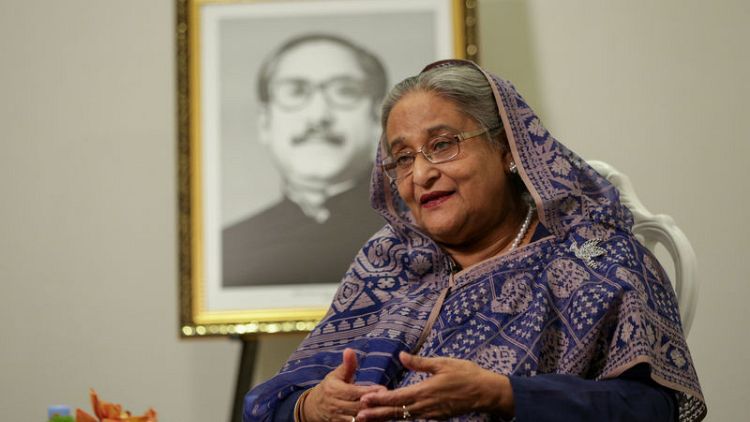By Zeba Siddiqui
DHAKA (Reuters) - Bangladesh's premier and ruling party leaders have attacked the opposition in the bitter campaign for Sunday's general election by relying on references to the country's 1971 war for independence from Pakistan.
Prime Minister Sheikh Hasina's father Sheikh Mujibur Rahman won the country that independence, and her Awami League party has run a campaign on reminding the public of "war criminals", "fake freedom fighters" and "collaborators".
It has also sought to paint the entire opposition as an "anti-liberation" front.
"Do you want to vote for betrayers?" Hasina, who is seeking a third consecutive term, said at a public speech this month, referring to Jamaat-e-Islami, an Islamist group that opposed the independence movement and several of whose members have been sentenced to death or life in prison for war crimes.
She says the main opposition Bangladesh Nationalist Party (BNP) is also culpable due to its traditional ties with Jamaat.
In the election, the BNP – in disarray following the jailing of its leader and former prime minister Khaleda Zia for alleged corruption - has joined smaller parties to form the National Unity Front alliance, headed by secular leader Kamal Hossain. The BNP did not contest the 2014 election, saying it would not have been fair.
Hossain, an 82-year-old Oxford-educated international jurist and close ally of Hasina's father in freedom struggle, has not been spared the attacks.
In a recent interview, Hasina's political adviser H.T. Imam questioned Hossain's role in the independence struggle and said it would be an "exaggeration" to call him a freedom fighter. He said he did not question Hossain's patriotism, but argued that "the way that he is portrayed as a significant freedom fighter is very wrong." Hasina has separately accused Hossain of "joining hands with war criminals and terrorists."
In a country that won independence only 47 years ago, memories of the nine-month-long Liberation War that claimed the lives of many thousands of people are still fresh in the minds of the older generation, making it a poignant campaign tool.
But it is used so frequently that it has often dominated the campaign, taking the spotlight away from civic issues, such as jobs, wages, and road safety, let alone any discussion of alleged human rights abuses under the government.
"The freedom movement is a convenient excuse to peddle. It's not just about whether you are in league with the Jamaat or not," said CR Abrar, a professor of international relations at the University of Dhaka.
"The independence struggle was also about equality, justice, and human rights. Where is the conversation on that?"
Hasina's government has been accused of extrajudicial killings, rampant arrests of critics and opposition workers, and curbs on the media – charges the government denies. The opposition alliance has vowed to reduce controls and "restore democracy" in Bangladesh, while also promising to retain a war crimes tribunal set up under Hasina.
Weeks before elections, a tense 'docudrama' on Hasina's life released in cinemas in Bangladesh depicted how most of her family, including her father who is known in the country as the Father of the Nation, was assassinated in 1975 in an army coup while she was away with her sister in Germany. Hasina refers to the BNP as thugs in the film.
Whether the war rhetoric will work is yet to be seen. Millions of new voters - many under 25 - are registered for Sunday's polls, which will be the country's first fully competitive election in a decade. Some Awami League leaders said the party's campaign was also focused on educating that young generation about the war.
"Now, the younger generation is getting a sense of what the history is about," historian and writer Syed Badrul Ahsan said.
(Additional reporting by Ruma Paul in Dhaka; Editing by Martin Howell and David Evans)
